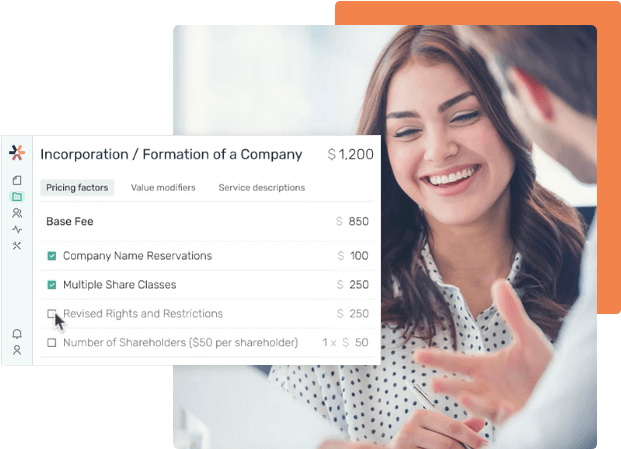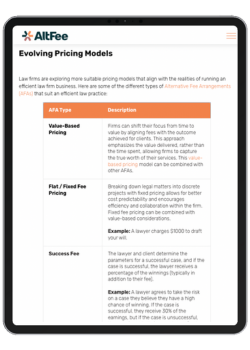- Resources
- How Legal AI Tools Support Law Firm Efficiency
Table of Contents
The pressure for law firms to be more efficient is only increasing. For many lawyers, it’s not just the workday spent helping clients—it’s the evenings and weekends as well.
- The 2022 Report on the State of U.S. Small Law Firms from Thomson Reuters indicates that the majority of small law firm lawyers spend just 56% of their time practicing the law. The rest of their time is dedicated to low-value billing-related tasks (such as invoicing) as well as administrative tasks.
- A November 2022 survey from the New Jersey State Bar indicated that 28% of lawyers in the state are considering leaving the profession because of mental health-related issues, burnout, or stress.
- A recent Report supported by the Canadian Bar Association that surveyed more than 7,300 legal professionals found that more than half of the respondents reported experiencing physiological stress and burnout.
Implementing legal technology to help address lawyer burnout and grueling workloads is already fast at work. As legal technology increases efficiency, law firms can see significant time savings, reducing industry burnout by increasing work-life balance. In addition, increased efficiency contributes to cost savings as well.
Modern law firms have long since ditched pen and paper for integrated computer systems and software. And while not a new concept, there’s no doubt that alternative fee arrangements (AFAs) are quickly becoming an essential pricing method for firms large and small. As law firm efficiencies increase, valuing services delivered based solely on the time they take to complete is no longer a viable option; to accurately capture the value they’re delivering to clients, firms are leaning into alternative pricing methods like firm fixed fees and leveraging purpose-built pricing software like AltFee to systemize their approach and maximize profitability.
It’s no surprise that artificial intelligence (AI)—technology that has been in continuous development for decades and has turned so many heads in recent months with the popularity of ChatGPT—has already started being integrated into the legal industry.
Legal AI tools promise to help with law firm efficiency problems by reducing administrative workload, handling repetitive, mundane tasks, and providing legal professionals with streamlined access to knowledge bases.
But with any new technology comes questions and concerns. Some legal professionals fear that AI will replace them, especially if they are junior-level employees. Firms that still rely on the billable hour increasingly realize that the clock is ticking on that pricing model, and AI is making that clock tick faster and faster.
However, the truth is that legal AI tools work to augment a legal professional’s abilities, not replace them. The billable hour, on the other hand, is on its way out, and AI-related legal technology trends are actively contributing to this fundamental shift in how legal services are priced.
AI entering the legal industry is definitely placing a spotlight on the two different pricing structures that the legal industry uses—AFAs and the billable hour—and shining brighter on AFAs. This article highlights the key reason why (efficiency) and explores the impact of artificial intelligence in the legal sector.
What is AI for Legal Firms?
Artificial intelligence software aims to mimic humans' problem-solving capabilities alongside the rapid processing power of computers. AI systems use algorithms to analyze large amounts of data to make predictions, identify patterns, find context, and recommend actions.
By analyzing large amounts of data, these AI-based algorithms also learn over time, meaning that predictions, pattern recognition, and recommendations only get better as the algorithm is “trained” with more and more data.
AI consists of a number of subsets, including:
- Machine Learning (ML)—Trains computers to learn based on data input. Instead of mimicking a human task, machine learning goes further to look for patterns and trends and draw conclusions from the data it analyzes.
- Deep Learning—As a more involved subset of ML, deep learning attempts to perform human-like tasks without human involvement. This usually presents in speech recognition, image recognition, automatic translation, and more. Deep learning can be applied to research, contract review, document drafting, and more for the legal industry.
- Natural Language Processing (NLP)—This subset of AI focuses on helping computers better understand how humans naturally communicate by reading, interpreting, and responding to human language. This can make searching for important documents, reviewing contracts, and overall legal research easier and more effective.
- Generative AI—Refers to algorithms that can be used to create new content via prompts (such as ChatGPT) including text, images, audio, video, and more. Generative legal AI tools may be able to assist legal professionals with creating documents and suggesting novel legal theories by searching through a knowledge base for an applicable precedent. McKinsey also suggests that generative AI could be an important creative partner for seasoned attorneys and other legal professionals.
Why Do Lawyers Need AI Legal Software?
The legal industry is becoming increasingly marketplace-driven. Clients want more value and transparency in their engagements with lawyers/firms and more responsiveness. The 2022 Legal Trends Report by Clio indicates that the top hireability factor for lawyers is client reviews, followed closely by response time and locale.
Aside from client satisfaction, legal professionals have a tendency to work extended hours. Burnout, stress, and mental health issues continue to plague the legal industry. Meeting client demand for an increase in communication and transparency while providing an adequate work-life balance to their legal professionals is a tough balancing act for law firms.
A big part of the solution to these changing market conditions and demands: increased efficiency.
Automation works to reduce the number of hours that legal professionals spend on lower-value billable tasks, such as contract tailoring and editing so that lawyers and legal professionals can spend more time on higher-value tasks.
- For example, document drafting and review time can be lessened with AI. Document review and drafting software can use AI to better understand the context behind a legal document, determine the appropriate areas to add boilerplate statements and names of the appropriate parties, and even check grammar and spelling. Imagine giving the software a generalized template for a contract or proposal, and it automatically fills in the majority of needed information in the right places without you needing to intervene.
- Another example is predictive analytics in case outcomes to reduce risk. If you’re a mature law firm with a ton of case data, AI can analyze vast amounts of data in different locations to predict the likelihood of success or failure of a case. By analyzing patterns in previous cases, AI can provide detailed recommendations for proceeding with a certain case, including settlement options, strategies, and resources needed. Case risk can also be calculated using real data rather than thoughts and opinions. Gaining this information via artificial intelligence and legal analytics significantly reduces research time and allows firms to make more informed decisions about whether they should take on a particular case or not.
How to Utilize Legal AI Tools for Alternative Fee Arrangements
To better understand how legal AI tools can apply to AFAs, it’s important to look at the challenges associated with developing an effective AFA strategy and determine how AI can help with that endeavour.
Predictable Legal Spend
Being able to predict how much a case or project will “cost” in terms of resources required is essential, especially when working with AFAs. Being able to accurately determine the scope of a case or project is one of the major challenges of AFAs.
In addition, law firms of all sizes, especially corporate legal departments, are under increased pressure to cut costs, but at the same time, don’t want to compromise the quality of work or level of customer service they provide.
Early Case Assessments (ECAs) and Decision Tree Analysis (DTAs) are common tools that legal professionals use to understand the scope of cases, but they can quickly become unreliable as they work to be more of a box-ticking exercise rather than a thorough way to evaluate the scope of a case. Instead, legal analytics can be used in conjunction with AI to analyze past case data and make effective predictions about resources needed for a case or project and its scope.
By using AI, legal professionals can not only more confidently scope matters, but they can also save significant time on research.
Price Based on Value
To price a matter effectively using an AFA, you must understand the service's “perceived value”. The perceived value consists of:
- What the client is willing to pay
- The benefit that the service provides to the client
- Competitor pricing
For law firms, value-based pricing should consider factors like project urgency, amount of money at stake, and risk. These factors and more make pricing based on the value a mix of art and science, but the difficulty of the process can be significantly lessened with AI and pricing software like AltFee.
Once again, legal analytics is important here. Giving legal AI tools the ability to analyze as much case data as possible is important so that the software can glean as much information as possible to make its suggestions. While legal professionals could do this as well, it takes AI significantly less time, and by telling it what information you’d like it to give you (e.g., patterns, trends, resources used, professionals involved, etc.), it can provide more information faster when compared to a person carrying out these same tasks.
At this point, lawyers can use the information from past cases and experiences that the AI highlights to better determine the value of different matters.
AltFee’s value modifiers are a new software feature that allows you to take a more strategic approach to value considerations and how they affect matter pricing. With this feature, you can create various value modifiers that can be applied to all matters or certain matters. For instance, if a matter has a high level of urgency, you could include a modifier that adds 10% to the overall base cost of the matter to account for the extra value being delivered to the client.
Start Earning More Revenue with Fixed Fees
Break free from hourly pricing and take the fear out of scoping and pricing client projects to start maximizing profitability.
Book A Demo
Benefits of AI Legal Services for Law Firms
Legal AI tools provide a wide range of benefits for law firms of all sizes. The main benefits are listed in more detail below:
1. Enhances Legal Team Rather Than Replace
There’s a lingering worry that legal artificial intelligence will replace lawyers or other legal professionals. While it’s true that legal AI tools can take over some specific tasks, it’s important to remember that data trains AI, and the AI itself doesn’t have any inherent intelligence. AI uses algorithms and calculations to provide answers to questions or insights into the data it analyzes—this also means that the data needs to be accurate and easily readable by the AI system, so law firms should look closely into effective data governance strategies. At the end of the day, AI can’t replace a lawyer’s experience, creativity, and ability to judge and reason.
Lawyers and law firms can take advantage of the fact that AI can analyze vast amounts of data in minutes rather than hours or days, and perform complex calculations with ease to augment their work, adding efficiency in how they get things done rather than replace the legal professional altogether.
2. Increases Efficiency
From spending less time locating hard-to-find case files to answering questions and completing legal analysis, AI increases a law firm's efficiency. Many firms are already using generative AI tools like ChatGPT-4 to augment the work of their legal professionals.
The efficiency increase is super important as law firms are under increasing pressure to cut costs while providing clients with more transparency and certainty with pricing.
3. Lawyers Can Focus On High-Value Tasks Rather Than Low-Value Ones
Rather than spending much of their time on lower-value tasks, such as invoice creation and general document editing, lawyers can enlist legal AI tools to take over some of the heavy lifting. Research, document review, and more can be taken over by AI, allowing the lawyer to focus on more important, high-value tasks.
Features of AI Legal Software

Various types of AI legal software are available for lawyers and law firms to utilize. Understanding what legal AI tools can potentially do for your business is important for predicting efficiency increases.
AI in legal can be used for a wide range of tasks, as outlined in the table below:
|
AI Legal Software Task |
Description |
|
Administrative |
Legal AI tools can set reminders for lawyers and clients, time tracking, invoice creation, and more. |
|
e-Discovery |
Platforms like Logikcull can sort through large volumes of documents and data, automate the legal discovery process, conduct thorough legal holds (litigation holds), and document AI and user actions. |
|
Document Review and Drafting |
Automatically filling in information on contracts like names, specific legal terms, and boilerplate legal statements, and reviewing contracts to ensure that they accurately include this information. Sensitive information in documents can also be automatically redacted with legal AI tools. |
|
Research |
Legal research can be done in seconds with AI, especially with legal AI tools’ ability to categorize, tag, and sort large volumes of data for easy searchability. |
How Will AI in Legal Firms Change the Way Clients are Billed?
Undoubtedly, AI legal software is accelerating the conversation regarding law firm efficiency. A more efficient law firm in turn helps clients more effectively, provides lawyers with a better work-life balance, and crucially, allows legal professionals to focus more of their time actually practicing the law.
AI allows lawyers to research case outcomes faster, draft documents more accurately, and take less time on tasks that are usually very time-consuming. Regarding billing, the key point is that increased efficiency is better suited to alternative fee arrangements over the billable hour.
How Will Legal AI Technology Change the Billable Hour?
Simply put, the billable hour doesn’t encourage efficiency. Lawyers that use the billable hour are more likely to record inaccurate times for tasks, and not just because they want more money, but because tracking everything you do in six-minute increments accurately is difficult and ultimately a poor measure of the value being delivered.
Legal AI technology, at this point in time, has mainly been used to help law firms and lawyers be more efficient. It helps with efficiency by taking over certain administrative and billable tasks, even acting as a knowledgeable assistant that you can ask questions and use to search databases.
As soon as more efficient workflows and processes enter the conversation, the billable hour’s fundamental model falls apart. Law firms simply can’t become more efficient and keep the billable hour, as it encourages inefficiency at every turn. At the end of the day, Law firms that still use the billable hour simply can’t become more efficient and expect to remain profitable without eliminating time-based billing.
Why? Because AFAs are more focused on outcome value rather than time spent. In other words, legal AI tools support the shift towards charging clients for an effective outcome rather than for time spent. Clients aren’t as concerned about how much time a lawyer spends on their matter as they are concerned about the outcome and quality of the service they are paying for.
What to Look For in Legal AI Tools
Even though the legal industry is just beginning to reap the benefits of AI tools, there are already a number of offerings on the market. Choosing a tool can feel overwhelming, so we’ve broken down the basics that you should be looking for in an effective legal AI tool:
|
What to Look for in a Legal AI Tool |
Description |
|
Security |
Highly sensitive client data and knowledge bases need to be secured. In Canada, PIPEDA requirements must be followed. In the USA, each state’s bar association has their own security requirements to be followed. |
|
Ease of use |
Legal AI tools should be easy to use for non-technical users. If the interface is too difficult to navigate, legal professionals in your firm may opt for using older methods instead. |
|
How well it matches the needs of your law firm |
Determine what you’d like to gain from the legal AI tool: easier document drafting and review, more efficient knowledge base searching, or in-depth legal data analysis. By narrowing down which tasks take the most time and looking for an AI tool that addresses those efficiency challenges, you can get a more targeted solution for your firm. |
|
Integrations support |
Having an integrated tech stack is important for business continuity and efficiency in your law firm. Look for legal AI tools with APIs facilitating connections with legal software or out-of-the-box instant integrations. |
|
Vendor reputation and support |
Read vendor reviews. Check out their social media pages. Ask colleagues if they’re aware of the tool. You want to gain an overall idea of the company’s reputation and level of customer service before implementing their software. |
How Will Artificial Intelligence in the Legal Industry Be Affected in the Short-Term?

In the short term, artificial intelligence in the legal sector is likely to be approached with cautious optimism. The majority of concerns revolve around data security and, from a wider perspective, the overall change in delivery, pricing, and execution of legal services.
A Thompson Reuters report that gained more than 440 responses from lawyers at large and midsize firms in the US, UK, and Canada indicates that attitudes are shifting from a lack of acceptance for legal AI tools to being cautiously proactive about using them.
82% of the survey respondents said legal AI tools can be used for legal work and 51% said that they should be applied.
For now, the main conversation around the use of legal AI tools revolves around increasing efficiency for law firms, helping them make better use of fewer resources but still provide quality service to clients.
Data security, however, is arguably the biggest concern. But similar to other online SaaS technologies, ensuring that the vendor provides effective security measures to protect sensitive legal data—something that all well-known SaaS law software vendors already do—then that concern can be quickly alleviated.
How Will Artificial Intelligence in the Legal Sector Be Affected in the Long-Term?
In the long term, as legal AI technology continues to evolve, the possibilities for its use in the legal sector will continue to grow. However, the use of this technology will likely continue to focus on efficiency and work augmentation, while better and more accessible tools will address the concerns surrounding data security.
It’s clear that the legal industry is experiencing a shift in thinking. According to Gartner’s Future of Legal research, the most resilient law firms have the following characteristics:
- Responsive and confident risk management—senior leaders are able to own resilience efforts, as well as coordinate, manage, and mitigate risks on a continual basis. This applies to operations and case management.
- A dynamic culture–modern legal professionals want a communicative, collaborative, and creative workplace to make timely and relevant decisions effectively.
- A flexible structure—Remote and hybrid working environments should be central to the firm’s operations, consisting of diverse and inclusive teams.
Legal AI supports this shift as an emerging technology that can be utilized to improve working conditions. It aligns with the foundational principles of alternative fee arrangements, specifically regarding their ability to shift the focus of legal services from time spent to value-based.
Conclusion
The conversation surrounding legal AI tools is far from over—it’s just getting started. As AI becomes more prevalent in everyday life, from augmenting our work and helping us become more efficient to changing how we bill for services, the benefits, challenges, and opportunities with artificial intelligence will only continue to evolve alongside the technology itself.
Speaking of efficiency, if you’re a client-centric law firm, chances are you already use alternative fee arrangements for some or all of your legal services. For managing your AFAs effectively and efficiently, consider checking out AltFee. Our collaborative pricing platform was built from the ground up by lawyers, for lawyers, to increase the efficiency and effectiveness of AFA fee management.
Get a Demo of AltFee today!
Start Earning More Revenue with Fixed Fees
Break free from hourly pricing and take the fear out of scoping and pricing client projects to start maximizing profitability.
Book A Demo





Newsletter Signup
Subscribe to our newsletter to receive the latest news.





